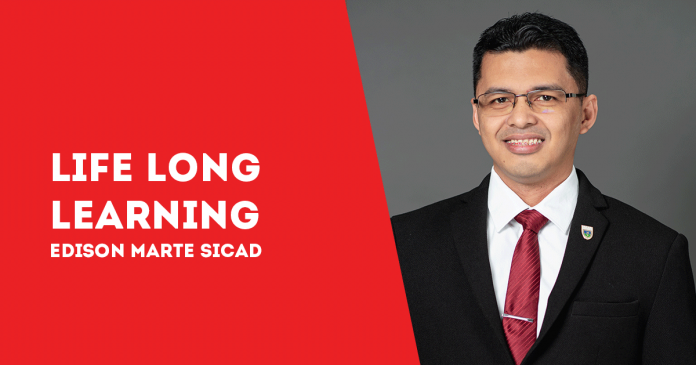
“…Orwell feared that what we hate will ruin us. Huxley feared that what we love will ruin us…” –Neil Postman, from his book Amusing Ourselves To Death
The Non-Thinking Literate
LAST WEEK, The Programme for International Student Assessment (PISA) 2022 results saddened some concerned Filipinos. The Philippines was the second-lowest in creative thinking among 64 ranked countries.
I would assume that most, if not all, have read the news on social media platforms (most likely on Facebook).
And I would also assume that those who gave their comments or likes have read the report. But somehow, I highly doubt it.
We Filipinos have all the time in the world to scroll for everything, but we don’t have enough time in our hand to read (in full) anything.
We are known for our tingi-tingi consumer mindset. This is somehow connected to our tiangge culture.
Our tendency to buy in small quantities to get through the day is also reflected in our attitude as information consumers: we don’t entirely read the news; we only read the headlines—or the FB wall. We seldom click the link and read the whole content. We just immediately give our comments and likes. We also readily share the post, a manifestation of a bandwagon or herd mentality.
What do we mean by creative thinking?
Can creative thinking be measured by a standardized test?
In an unfortunate manner, our PISA results have been dismally consistent.
Arguably, we don’t need the PISA results to tell us how lazy we are in thinking. Our level of discourse has become so highly personal and opinionated that freedom of expression has been divided into two laughable groups: those who get easily offended and those who post for the sake of offending.
Ironically, the social media connect us, not to unite, but to clash against each other; not to cooperate but to magnify our petty conflicts; not to promote personal growth, but to trigger anxieties and depression. Technology hastened the decline of authentic learning.
Our state of education is directly related to the state of our nation.
I would argue that what we primarily need are not good leaders, but good readers. This would mean good voters as well. But to wish and fight for a social ideal is an invitation to personal despair and disappointment.
Isn’t it that when a team speaks and represents unity, the leaders of that team have pledged to serve and unite all its members?
The non-reading graduates
Creative thinking goes beyond curriculum requirements. A creative mind must be fed by creative ideas. And creation involves a thinking process that leads into holistic growth. In a sense, the reading of books is one habit that can nourish the mind for a healthy thinking process. We are what we read.
Unfortunately, if you ask teachers and students why reading books is not a school-culture, the answer is, “There is no more time for reading books.”
Day in and day out, teachers have to finish some paper works, students have to prepare for a test, and school officials have to make sure that everything is followed to the letter.
Try this: Ask your teachers (and school officials) what book or books (not textbooks) they are reading in relation to the subjects they are teaching. Or what they are reading for continuous learning and for personal and professional growth.
Of course, there are teachers who are (book) readers. In fact, professionals in different fields read books to widen and deepen their perspectives, which can improve their work-related activities and personal well-being.
Since it is in schools that habits are cultivated and reinforced, and exemplified primarily at home, the actions of teachers are the best teaching moments. A school cannot just impose to students a reading program if the teachers (and school officials) themselves are not into reading.
The non-sense activist (or the absence of common sense)
In the grand universe of social media discourse, whose opinion matters the most?
We have expressed our freedom of expression to exploit and abuse the right to privacy. Not only do we take lightly the privacy of others, we also use our very own privacy as a currency to get people’s attention. We just don’t beg for attention, we exchange “selfishly” the sacredness and worthiness of our private lives for a mere pittance of likes, assumed validation, and pretentious praises from others.
What is the function of social media platforms? In an environment where an “object” has no real definite purpose, the concept of use can hardly be distinguished from abuse. In another sense, we are taking a popular and “effective” medicine with side effects that cannot be easily detected but only realized after the damage has been done.
Not only meaning, but meaningfulness
“What Orwell feared were those who would ban books. What Huxley feared was that there would be no reason to ban a book, for there would be no one who wanted to read one. Orwell feared those who would deprive us of information. Huxley feared those who would give us so much that we would be reduced to passivity and egoism. Orwell feared that the truth would be concealed from us. Huxley feared the truth would be drowned in a sea of irrelevance.” –Neil Postman
We have been triggered and needlessly entertained. We are now on digital (social media) steroids.
***
*Two of the ten key insights about the PISA 2022 results https://www.oecd.org/publication/pisa-2022-results/
Limit the distractions caused by using digital devices in class
Students who spent up to one hour per day on digital devices for learning activities in school scored 14 points higher on average in mathematics than students who spent no time. Enforced cell phone bans in class may help reduce distractions but can also hinder the ability of students to self-regulate their use of the devices.
Strengthen school-family partnerships and keep parents involved in student learning
Higher-performing students reported that their family regularly eats the main meal together, spends time just talking with them, or asks them what they did in school that day. They also report better sense of belonging and life satisfaction./PN







